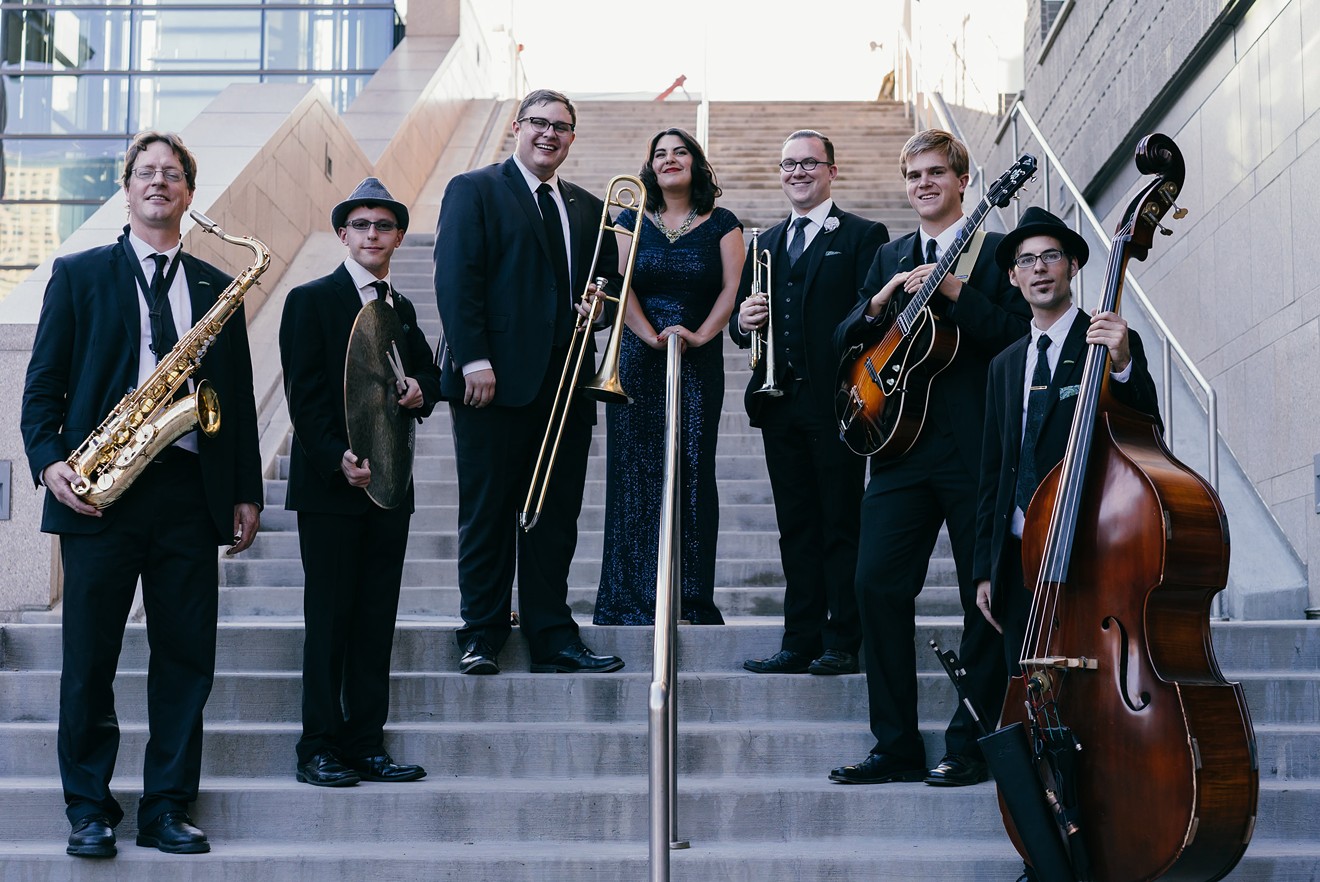Trumpeter Joe Smith, who fronts the vintage jazz band Joe Smith and the Spicy Pickles, originally wanted his act’s third album to comprise all Count Basie songs. Last November, veteran jazz vocalist Jessy Carolina, who was moving from New York to Los Angeles, contacted Smith and asked if they could work together. Since the band had a chance to collaborate with Carolina, Smith put the Basie album on the back burner. Instead, he dove into Gin & Moonlight, the act’s first album with a female vocalist.
The bandmembers and some of the arrangers they work with wrote five originals and rearranged seven classic tunes to evoke the style of a 1930s Basie band. Many of the songs have moon or gin references in either the lyrics or the title.
Smith considers Gin & Moonlight to be an album that someone might listen to after work, sipping a stiff drink, relaxing and just staring at the moon and the stars.
“It’s a very reflective time for me to consider all the love lost and gained in life and the adventures both good and bad, and what the hopes for the future are,” Smith explains. “That’s kind of how I see this album.”
Denver singer Cara Griffith also sings on Gin & Moonlight; she's been touring with the band and playing local shows.
Smith says that for the last three and a half years, since the band started, he had people tell him the group needed a singer to connect with audiences, which is important to a band whose members' ages range from 23 to forty.
“I think the hardest part of it is that everyone thinks [big band-era music] is so antiquated,” Smith says. “They really associate it with blue-hairs. It’s like old people falling asleep. I think the reason they do that is because what’s stereotypical anymore is old people playing this music. The energy changes when you put a young group on stage. When young people see it played by young people, they can actually relate to it. I think that’s the huge difference.
“That’s kind of what we’re trying to get to people: ‘Hey look, we’re young.’ We still see this as party music. This is still a relatable music in every sense. This was created for American people. It still is for American people.”
Smith hopes to convince younger people that big-band music of the ’30s and ’40s is cool by giving them a chance to see young people playing it. When the act performs at the Mercury Cafe on its swing-dance nights, he hopes there will be more than 200 people – most between the ages of sixteen and forty; that’s the demographic the group has entertained in other venues nationwide.
Smith first fell in love with the big-band era while studying classical music at the University of Iowa. As a way to meet people, he spent about six months swing-dancing there before going to New Orleans, where he says younger musicians still play the music. There, his passion for the style only grew.
“I love the traditional New Orleans stuff, but my heart is really in that late 1930s, 1940s kind of vibe,” Smith says.
Back then, the music was considered party music, and Smith says it’s still party music today. “It’s just a little bit different than what everybody expects,” he continues. While classical music has been considered the music of the heavens, Smith says traditional jazz was music of the people – of the earth.
“It really connected with people,” he says. "Then bebop and forward, they’re really trying to be that music of the heavens again. They’re trying to be at that sophistication level of classical music. I think that’s where some people get lost.”
Smith notes that big-band melodies are hummable.
“I think that’s the huge difference,” he says. “Bebop is just crazy. They’re wanting to show how academically smart they are, and swing music is more music of the heart.”
Joe Smith and the Spicy Pickles CD-release, 8:30 p.m. Friday, September 15, St. Cajetan’s, 101 Lawrence Way, Auraria campus, $20.
[
{
"name": "Air - MediumRectangle - Inline Content - Mobile Display Size",
"component": "12017618",
"insertPoint": "2",
"requiredCountToDisplay": "2"
},{
"name": "Editor Picks",
"component": "17242653",
"insertPoint": "4",
"requiredCountToDisplay": "1"
},{
"name": "Inline Links",
"component": "18838239",
"insertPoint": "8th",
"startingPoint": 8,
"requiredCountToDisplay": "7",
"maxInsertions": 25
},{
"name": "Air - MediumRectangle - Combo - Inline Content",
"component": "17261320",
"insertPoint": "8th",
"startingPoint": 8,
"requiredCountToDisplay": "7",
"maxInsertions": 25
},{
"name": "Inline Links",
"component": "18838239",
"insertPoint": "8th",
"startingPoint": 12,
"requiredCountToDisplay": "11",
"maxInsertions": 25
},{
"name": "Air - Leaderboard Tower - Combo - Inline Content",
"component": "17261321",
"insertPoint": "8th",
"startingPoint": 12,
"requiredCountToDisplay": "11",
"maxInsertions": 25
}
]












